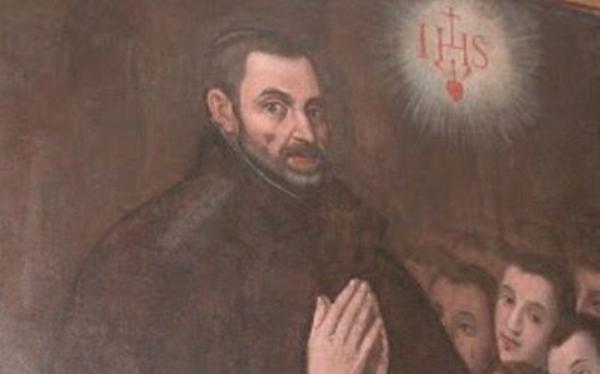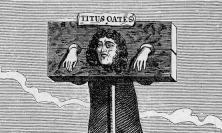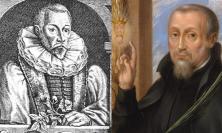Last month marked the anniversary of the death of Robert Persons, the English Jesuit who presided over the mission to his homeland and retained a deep concern for English Catholicism even after he was forced to flee the country. Despite his reputation as a controversial figure, he was sent to the English College in Rome, where his resolution of several ongoing disputes revealed a lesser known side to his character, suggests Thomas McCoog SJ.
On 15 April 2010, the 400th anniversary of the death of Robert Persons, arguably the most controversial Englishman to enter the Society of Jesus, passed without much fanfare. On Thinking Faith, Joe Egerton did indeed pay homage to Persons as he applied principles from the Jesuit’s writings to contemporary political situations, and also drew attention to a persistent preference for Edmund Campion over Persons, his religious superior on the English mission.
For the Elizabethan government, for some Catholic contemporaries and for a few subsequent historians, Persons exemplified the Jesuit of myth and legend. A secular priest, William Watson, himself executed in 1603 for alleged involvement in a plot against King James I, lamented the establishment of an uncommon ecclesiastical structure, the archpresbyterate. The archpriest exercised jurisdiction over the diocesan clergy within England, but according to the regulations, on matters of importance he could not act without prior consultation of the Jesuit superior. Watson complained: ‘For whereas now all Catholikes must depend upon the Archpriest, & the Archpriest upon father Garnet, & Garnet upon Persons, & Persons upon the devel, (the author of all rebellious conspiracies, treasons, murthers, disobedience, heresies, & all such other diabolicall & bloudy designements, as this wicked Iesuit hath hitherto devised) then and in what case this dependency had bin utterly void.’ (A Decacordon of Ten Quodlibeticall Questions concerning Religion and State [N.p. (London), 1602] pp. 150-51).
Persons and Campion
In more contemporary historiography, J.B. Black, in The Reign of Elizabeth (2nd edition [Oxford, 1959]), wrote of Campion that he
was the beau sabreur of spiritual gladiators – a radiant figure, whose nonchalance in the face of danger won for him imperishable renown among his followers, and a high place in the gallery of great Elizabethans. His saintliness, transparent sincerity, and glowing rhetoric were infectious and it was largely through his ministrations that Catholicism in England rose to the heights of heroism it reached during the eighties’ (p. 179).
Of Persons, he wrote:
Gifted with a trenchant personality, he had all the qualities – resourcefulness, perseverance, foresight – that show the man of action rather than the saint or the pastor. His mind never ran on small things; and it is more than likely that the general of the order marked him down from the very first as too valuable a man to be ‘expended’ in the narrow field of the English mission. His remarkable talent for organization quickly raised him to the forefront of the counter-reformation. Nevertheless, there is plenty of evidence to show that Persons’s sympathy lay with the men who served as the ‘shock troops’ of the church, in the front lines of battle’ (p. 180).
Campion is perceived as a chivalrous knight out of the Morte d’Arthur; Persons, a ruthless schemer out of Machiavelli’s The Prince. Professor John Bossy, historian of post-Reformation English Catholicism, admires Persons because he ‘was no angel, he got his hands dirty, he was touched with the sin of the world; but if he had kept himself as clean as Campion perhaps nothing would have got done at all’ (‘The Heart of Robert Persons,’ in The Reckoned Expense. Edmund Campion and the Early English Jesuits, ed. Thomas M. McCoog SJ, 2nd edition [Rome, 2007] p. 187). Persons was the driving force behind the English mission from its inauguration in 1580 to his death in 1610. For 30 years, he courted earthly powers, wrote masterpieces of controversial literature, adapted Ignatian spirituality for English Catholic (and Protestant) readers, solicited funds for colleges and seminarians, and infiltrated Elizabeth’s court. One may well ask if Campion would have been up to the task if he had survived and Persons been martyred.
Practically from his admission into the Society of Jesus in Rome, Robert Persons retained contact with other Englishmen and campaigned for Jesuit involvement on the English mission. Campion, meanwhile, showed little if any concern for his native land. Indeed, his friend Gregory Martin accused him of forgetting England altogether once he had entered the Society. Collaborating with William, later Cardinal, Allen, Persons finally succeeded in persuading a reluctant Father General Everard Mercurian to seize the opportunity provided by the qualified religious tolerance that would follow the marriage/alliance of Queen Elizabeth and Francis de Valois, Duke of Anjou. Persons volunteered for the mission; Campion was selected. Campion admitted more than once that only obedience motivated him.
Instead of toleration, Persons, Campion and Ralph Emerson found renewed persecution. A Spanish-papal expeditionary force to Ireland fueled anti-Catholic propaganda as Protestants asserted this military venture as the true face of Catholicism, and a probable consequence of the marriage treaty and tolerance. One should not forget that ten years earlier, Pope Pius V had declared Elizabeth an excommunicated, heretical bastard and commanded English Catholics to work for her dethronement. Nonetheless Persons did not abandon hope. He dedicated the first Jesuit work published in England, A brief discours contayning certayne reasons why Catholiques refuse to goe to church (Doway [vere London], 1580) ‘TO THE MOST HIGHE & MIGHTIE Princese ELIZABETH by the grace of God, Quene of England France and Irland &c.’ On her he showered compliments. Unlike Puritans who encouraged sedition, Catholics taught obedience to their rulers and obeyed all but her religious laws. Persons concluded his dedication with a prayer: ‘IESUS Christ, in abundance of mercye, blesse your Maiestye, to whome (as he knoweth) I wyshe as much good as to mine owne soule: perswading my selfe, that all good Catholicks in England do the same.’ The collapse of the pro-marriage alliance and the re-ascendancy of Protestant councillors resulted in new anti-Catholic legislation. ‘An Act to Retain the Queen’s Majesty’s Subjects in Their Due Obedience’ (23 Eliz. c. 1) demanded that all recusants conform at least once a month. Failure to do so could result in financial ruin: a £20 fine for each month’s absence. Anyone convicted of persuading a subject of the queen to abandon the established church in favour of the church of Rome would be guilty of high treason, as would anyone so reconciled. Penalties against both saying and attending Mass were increased. In order to enforce these laws more effectively, all who had knowledge of any reconciliations must report the fact to the justice of the peace within twenty days or be charged with misprision of treason for withholding the information. Common informers were encouraged with promises of a third of the fines of all recusants discovered. Since the old religion refused to pass away quietly, in the terse summary of Christopher Haigh, ‘it would have to be murdered’ (Elizabeth I [London, 1988] p. 38).
Persons in France and Spain
Campion was captured the following July and martyred with Ralph Sherwin and Alexander Briant on 1 December 1581. While Campion was imprisoned in the Tower of London, Persons fled to France never to return to England. Now instead of praising Elizabeth, Persons tried to bury her metaphorically if not actually. In France, Persons associated with the zealous Catholic League in that religiously divided kingdom. Henri, Duke of Guise and de facto head of the League, used England as an example of what would happen to French Catholics if the Protestants gained control. The Guises had earlier provided support and refuge for the English College as it fled Douai for Reims in March 1578. They had also tracked Elizabeth’s treatment of Mary, Queen of Scots, imprisoned in England since 1568, whose mother was a Guise. Bossy suggests that the martyrdom of Campion radicalised Persons. Perhaps – it may have been the new anti-Catholic legislation that threatened Catholics not just financially in this life but their very eternal salvation in the next. A monarch that permitted such legislation and persecution must be resisted and overthrown. Instead of lavish praise for the queen, Persons and Allen decried her councillors and the queen herself for a ruthless persecution. What shall it profit a man if he evade fines through attendance at the service of the Established Church, and suffer the loss of his soul? During this period Persons and Allen played major roles in ventures and negotiations, including the 1588 Armada, concerning the invasion of England and/or Scotland, the liberation of Mary, assistance to the beleaguered King James VI of Scotland, and the removal of Queen Elizabeth.
After the defeat of the Armada, Persons was sent to Spain by Father General Acquaviva; his assignment was to keep England on the royal political agenda. Through his influence at the court of King Philip II, he established seminaries and colleges for the preservation of English Catholicism. He secured subsidies for English colleges in Valladolid (a royal foundation 1589), Seville (1592), and St. Omers (a royal foundation 1593). By March 1594, as a result of Persons’s intervention at the request of Cardinal Allen, Philip II paid the money that he owed the English College as it returned to Douai. Persons also provided some assistance to the Irish Jesuit James Archer and the Scottish Jesuit William Crichton in their efforts to establish colleges for their homelands. Moreover he advised King Philip on possible military ventures to support English Catholics and on Spanish claims to the English throne on the death of Elizabeth. Persons feared that this apostolate violated a decree of the Fifth General Congregation (1593-1594) against Jesuit involvement ‘in what is secular and belongs to political affairs and the governance of states.’ He explained to Father General Claudio Acquaviva that the ‘interests of the Catholic religion in England are so bound up and intermingled with those of the state that one can not deal with the first without treating the second.’ Thus he requested a dispensation. The general refused. But he made an important distinction: the decree did not forbid Jesuits advising rulers on issues intended for the greater glory of God even when such matters were intertwined with state affairs. Is this simply a magnificent illustration of the OED’s second definition of ‘Jesuit’? Or a tentative, practical formulation of the doctrine of ‘indirect power’ then being formulated by Jesuit philosophers? Confidently expecting the restoration of Catholicism either by concession, force or succession, Persons drafted guidelines for the foundation of a Catholic kingdom more in line with post-Trent counter-reformation zeal than medieval monastic piety.
Persons loved Spain even though Spanish Jesuit provincialism periodically irritated him. Spaniards demonstrated little interest in the affairs of foreign Jesuits. They were good men, Persons stressed, but because of their myopia, they were a trial to non-Spaniards. With little experience of the world beyond Spain, they did not understand it. And they could not love what they did not understand. Persons realised how much the English Colleges in Spain needed the support of Spanish Jesuits. More than once he had to subdue an angry English Jesuit, for example, Joseph Creswell, from transforming a personal irritation into a national conflict that would threaten the very existence of these institutions. Persons’s careful handling of these affairs reveals a dimension generally overlooked: Persons the peacemaker.
Persons the peacemaker
The English College, Rome, was a volcano never dormant for long. Conflict and disruption between Welsh and English students resulted in Pope Gregory XIII’s insistence that the Society of Jesus assume the college’s administration in 1579. Tension continued even though the issues varied: Jesuit administration in general; Jesuit siphoning off better students for their novitiate; Jesuit control over the English mission; ecclesiastical discipline and structure on the mission; Persons’s candidacy for the red hat after William Allen’s death in 1594; and Jesuit pro-Spanish sentiment. By the mid-1590s Acquaviva worried how the conflicts would damage the Society’s reputation and pondered whether he should withdraw Jesuits from the college. In early 1597 Persons set out for Rome. The settlement of disputes at the English College was a reason for the trip. He never returned to Spain; in fact, with the exception of an exile in Naples from late 1604 to circa May 1605, he did not leave Rome. And the Society of Jesus remained at the English College.
To many at the English College, Persons was a persona non grata. They could not believe that the very person who personified their complaints should be brought in to resolve the problem. On Easter Sunday, 2 April 1597, Persons addressed the seminarians, many of whom most likely attended under duress. He exhorted the audience to peace and unity. The disagreements and discord, clearly the work of Satan who sowed darnel among the good seed, destroyed tranquillity and co-operation. Satan had numerous goals in mind: he has destroyed the peace of mind of the students, damaged the institution’s reputation, provided so many distractions that the students could not study, disrupted good relations with the Society of Jesus. Persons stressed that the Society had been the mission’s most steadfast friend. At the pope’s command, Persons moved from the Jesuit professed house to the English College on the 9 or 10 of April. Immediately he initiated negotiations with the unhappy students. To the consternation of all, reason reigned during the days of discussion. Each side listened to the motives and grievances of their opponents; each side recognised the other had valid points. To the consternation of many, Persons the ogre became Persons the arbitrator. Edward Bennett, one of the leaders among the discontented seminarians, confessed that ‘he whom we most feared, and whom we accounted for our greatest enemy, hath been our greatest friend; yea, and the only man that hath satisfied us, and put an end to these troubles.’ So impressed were the students they requested Persons be named rector: he was so named on 13 December 1597 and held the office until his death.
Persons may have ended disputes at the English College but not on the English mission. During the final years of Elizabeth’s reign, circa 1598 to 1603, the so-called Archpriest (or Appellant) Controversy unleashed an intramural battle. English Roman Catholics lacked a hierarchy, indeed any sort of ecclesiastical structure. The Jesuit superior had authority within the Society of Jesus and indirectly over the secular clergy. Requests that one or two bishops be appointed for England, requests in fact supported by Persons and many English Jesuits, were rejected. Instead the cardinal protector established an archpresbyterate with an archpriest and his councilors. As noted above, the instructions demanded that he consult the Jesuit superior on all important matters. Some saw Jesuit, and especially Persons’s, involvement in the denial of the request for bishops. Jesuits, they asserted, wanted to dominate secular clergy; they opposed bishops in order to retain their power and authority. As some sought papal clarification (the so-called appellants), others launched a vicious campaign against the Society. The appellants directed anti-Catholic rhetoric and opposition on the real culprits – the Jesuits – whose provocation resulted in the penal legislation. Former associates now ranted against Persons. Appellant clergy, often with support from the government, attacked Persons and the Jesuits. Persons more than competently defended himself and the Society of Jesus, often with confidential information obtained from Elizabeth’s Privy Council. Persons the controversialist looms large, but Persons the peacemaker makes frequent appearances. Persons reprimanded the archpriest for his harsh treatment of the appellants, and reminded him ‘that authority is given in edificationem [to build up] as they say and not in destructionem [to tear down], and albeit they being urged by us about the indignity to suffer such insolences, yet say that all is to be borne or dissembled rather then to drive men to so great breaches.’ John Mush, one of the agents of the appellants, spent a number of months in Rome. Persons tried to contact him but Mush refused to have anything to do with the Jesuit. Persons complained in a letter to him that no spirit was more hostile to the spirit of Christ than the ‘spirit of disunion, contention, envy, emulation, anger, and enmity.’
Persons wrote numerous letters during the week before his death. Throughout his life, he reminded the archpriest that he had worked for the mission without any desire for prestige or power. ‘A friendly concurrence to the good and furtherance of the Catholick fayth according to the functions of our institute’ motivated him. He exhorted Jesuits on the mission ‘to unite together in this mission of our Society for the Conversion and consolation of our poor afflicted Country of England.’ He urged Father General Acquaviva to keep English matters close to his heart.
England was never far from Persons’s heart. As a spiritual writer, diplomat, theologian, controversialist, fund raiser, and peacemaker, Persons worked for the restoration of Roman Catholicism and presided over the growth of the Jesuit mission. His epitaph at the English College, having listed his many accomplishments, concludes: ‘In every way he was man to marvel at in his 63 years of life, 36 as a Jesuit. He was an example to us in all virtues.’
Thomas M McCoog SJ is the Archivist of the British Province of the Society of Jesus.
This is a revised summary of a talk delivered at the Venerable English College, Rome on 15 April 2010, the 400th anniversary of the death of Robert Persons.






